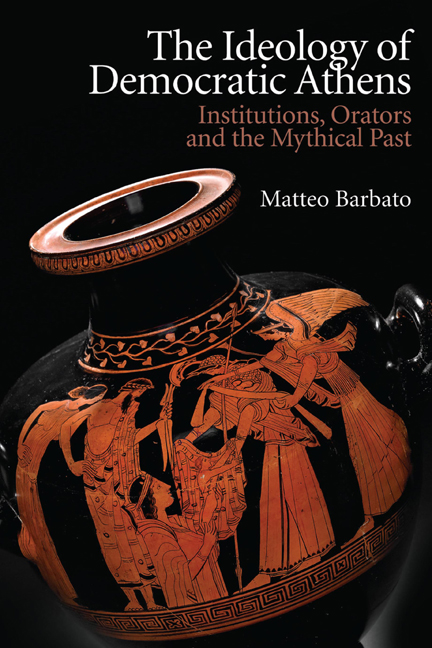Book contents
- Frontmatter
- Contents
- List of Tables and Illustrations
- Preface
- Abbreviations
- 1 Introduction
- 2 Myth and Athenian Democracy
- 3 The Discursive Parameters of Athenian Democratic Institutions
- 4 Exclusiveness and Eugeneia in the Myth of Autochthony
- 5 Between Charis and Philanthrōpia: The Heraclidae
- 6 Fading Shades of Hybris: The Attic Amazonomachy
- 7 Combining Hybris and Philanthrōpia: The Myth of Adrastus
- 8 Conclusions
- Bibliography
- Index Locorum
- General Index
7 - Combining Hybris and Philanthrōpia: The Myth of Adrastus
Published online by Cambridge University Press: 17 October 2020
- Frontmatter
- Contents
- List of Tables and Illustrations
- Preface
- Abbreviations
- 1 Introduction
- 2 Myth and Athenian Democracy
- 3 The Discursive Parameters of Athenian Democratic Institutions
- 4 Exclusiveness and Eugeneia in the Myth of Autochthony
- 5 Between Charis and Philanthrōpia: The Heraclidae
- 6 Fading Shades of Hybris: The Attic Amazonomachy
- 7 Combining Hybris and Philanthrōpia: The Myth of Adrastus
- 8 Conclusions
- Bibliography
- Index Locorum
- General Index
Summary
The Athenians prided themselves on having helped the Argive king Adrastus to recover the bodies of his seven chieftains and their soldiers who had died in war against Thebes. The story was the sequel of the myth of the Seven against Thebes, which told of Adrastus’ failed campaign to settle the enmity between Oedipus’ sons, Eteocles and Polynices, and restore Polynices to the Theban throne. The war between the brothers was attested as early as in the Iliad, which recalls Tydeus’ participation in the Argive expedition (Hom. Il. 4.376–98; 5.801–8; 10.285–90). The myth of the Seven was the subject of the lost epic Thebaid. The poem attributed the enmity between Eteocles and Polynices to Oedipus’ curse upon them (Thebaid frr. 2–3 Bernabé), but the surviving fragments do not tell us anything about the quarrel and ensuing campaign. Some authors seem implicitly to attribute the responsibility of the conflict to Polynices. According to Stesichorus, Jocasta proposed a lot to determine which of her sons should keep the throne and which take the flocks and gold and leave the city to avoid bloodshed (PMGF 222b). Hellanicus similarly wrote that Polynices forfeited the throne in exchange for the tunic and necklace of Harmonia and went to Argos (FGrHist 4 F 98). Other authors straightforwardly make Eteocles responsible for the conflict. Pherecydes maintained that Eteocles expelled Polynices by force (FGrHist 3 F 96; cf. Soph. OC 1292–8). In Euripides’ Phoenician Women, Eteocles and Polynices agreed to rule in alternate years, but Eteocles broke the pact and exiled his brother (Eur. Phoen. 55–80). Adrastus’ unsuccessful expedition against Thebes and the mutual killing of the two brothers became a popular subject on the tragic stage. The story was most famously performed in Aeschylus’ Seven against Thebes and Euripides’ Phoenician Women, whereas the impending war between Eteocles and Polynices was central in Sophocles’ Oedipus at Colonus.
Two traditions existed about the burial of the Seven. According to one tradition, the Seven received burial in Thebes. Already in the Iliad we read that Tydeus had been buried in Thebes (Hom. Il. 14.114). The burial of the Seven in Thebes is mentioned twice by Pindar.
- Type
- Chapter
- Information
- The Ideology of Democratic AthensInstitutions, Orators and the Mythical Past, pp. 182 - 214Publisher: Edinburgh University PressPrint publication year: 2020



